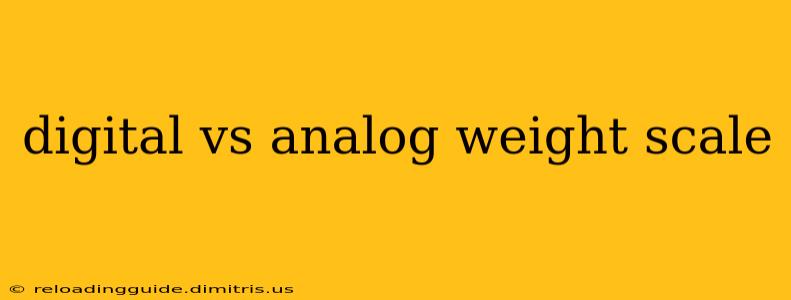Choosing between a digital and an analog weight scale might seem simple, but there are key differences that significantly impact accuracy, convenience, and overall user experience. This comprehensive guide will delve into the pros and cons of each type, helping you make an informed decision based on your specific needs.
Understanding the Basics: Digital vs. Analog
Both digital and analog scales serve the same primary function: measuring weight. However, their mechanisms and displays differ significantly.
Analog scales use a mechanical system of weights and levers to indicate weight on a dial. The weight you place on the scale deflects a pointer, showing your weight on a calibrated scale.
Digital scales utilize internal sensors (often strain gauges) to measure weight and display the result on a digital screen. This process is typically much more precise than the analog method.
Digital Weight Scales: Precision and Convenience
Digital scales offer several advantages that make them a popular choice for many users:
Pros:
- High Accuracy: Digital scales generally provide more precise measurements than analog scales, often down to fractions of a pound or even grams. This precision is crucial for tasks requiring exact weight measurements, such as cooking, baking, or scientific applications.
- Easy Readability: The digital display eliminates the need for interpretation, making it easy to read the weight, even in low-light conditions. No more squinting to decipher a tiny pointer on a dial!
- Additional Features: Many digital scales offer additional features beyond basic weight measurement, such as unit conversion (pounds to kilograms, ounces to grams, etc.), tare function (subtracting the weight of a container), and even body fat percentage analysis (for body composition scales).
- Durability (depending on the model): While some digital scales might be more fragile than sturdy analog scales, many are built to withstand daily use.
Cons:
- Battery Dependence: Digital scales require batteries, which need replacing periodically. This can be an inconvenience, especially if you forget to change them when needed.
- Potential for Electronic Malfunction: Though rare, digital scales can malfunction due to electronic problems. This can lead to inaccurate readings or complete failure.
- Cost: Digital scales often come with a slightly higher price tag than comparable analog scales.
Analog Weight Scales: Simplicity and Reliability
Despite the advancements in digital technology, analog scales still hold their own, particularly for certain applications:
Pros:
- No Batteries Required: Analog scales are purely mechanical and require no power source, making them a reliable choice even in situations where batteries are unavailable.
- Simple Design & Durability: Typically built with robust materials, analog scales are known for their simplicity and long lifespan. They're less prone to damage from drops or impacts than some digital scales.
- Lower Cost: Analog scales are generally cheaper than digital scales, making them a budget-friendly option.
Cons:
- Lower Accuracy: Analog scales usually provide less precise measurements than digital scales. The accuracy can also be affected by the condition of the mechanism and calibration.
- Difficult to Read: Reading analog scales can be challenging, especially for individuals with vision impairments, and the measurements aren't always easily interpreted.
- Limited Functionality: Analog scales typically offer only basic weight measurement; extra features are non-existent.
Which Type of Scale is Right for You?
The best type of weight scale depends on your individual needs and priorities:
-
Choose a digital scale if: You need high accuracy, easy readability, and appreciate additional features. This is ideal for cooking, baking, scientific work, or anyone who values precise measurements.
-
Choose an analog scale if: You prioritize simplicity, reliability, affordability, and don't require high precision. This is a good choice for basic weighing tasks where precise measurements aren't critical.
By carefully considering these factors, you can select the weight scale that best fits your lifestyle and requirements. Weighing your options literally will lead you to the perfect fit!

